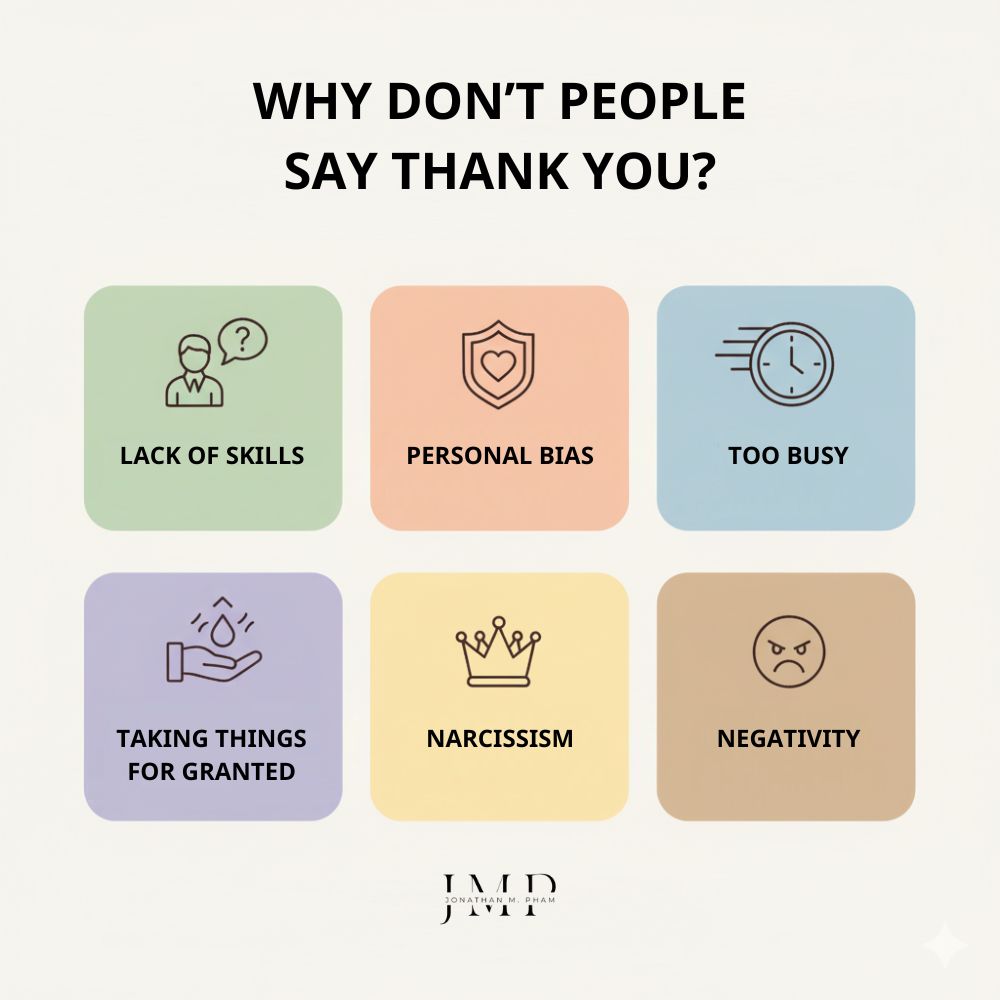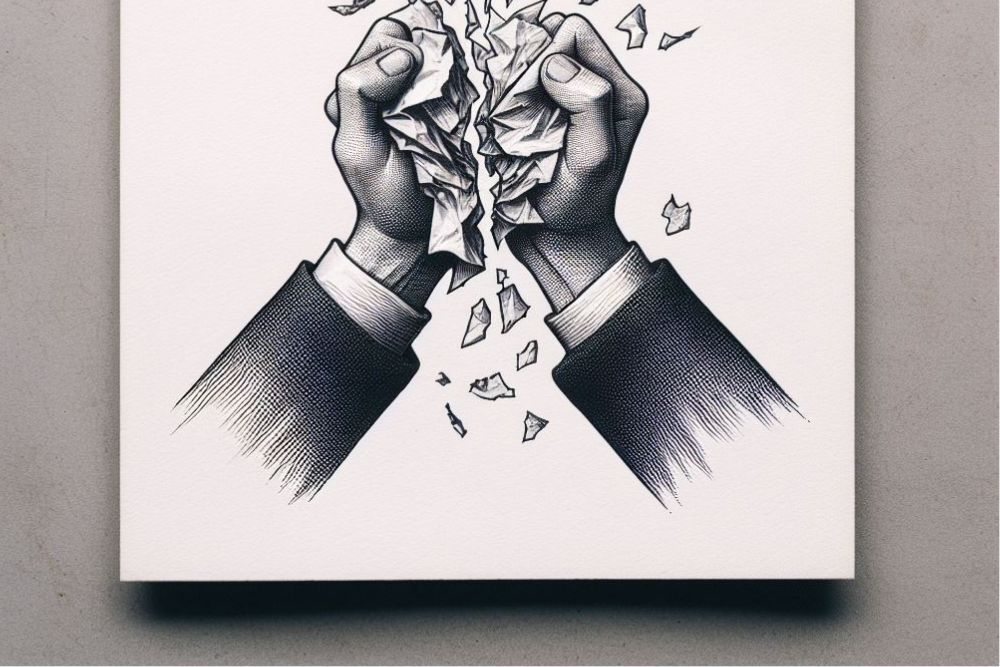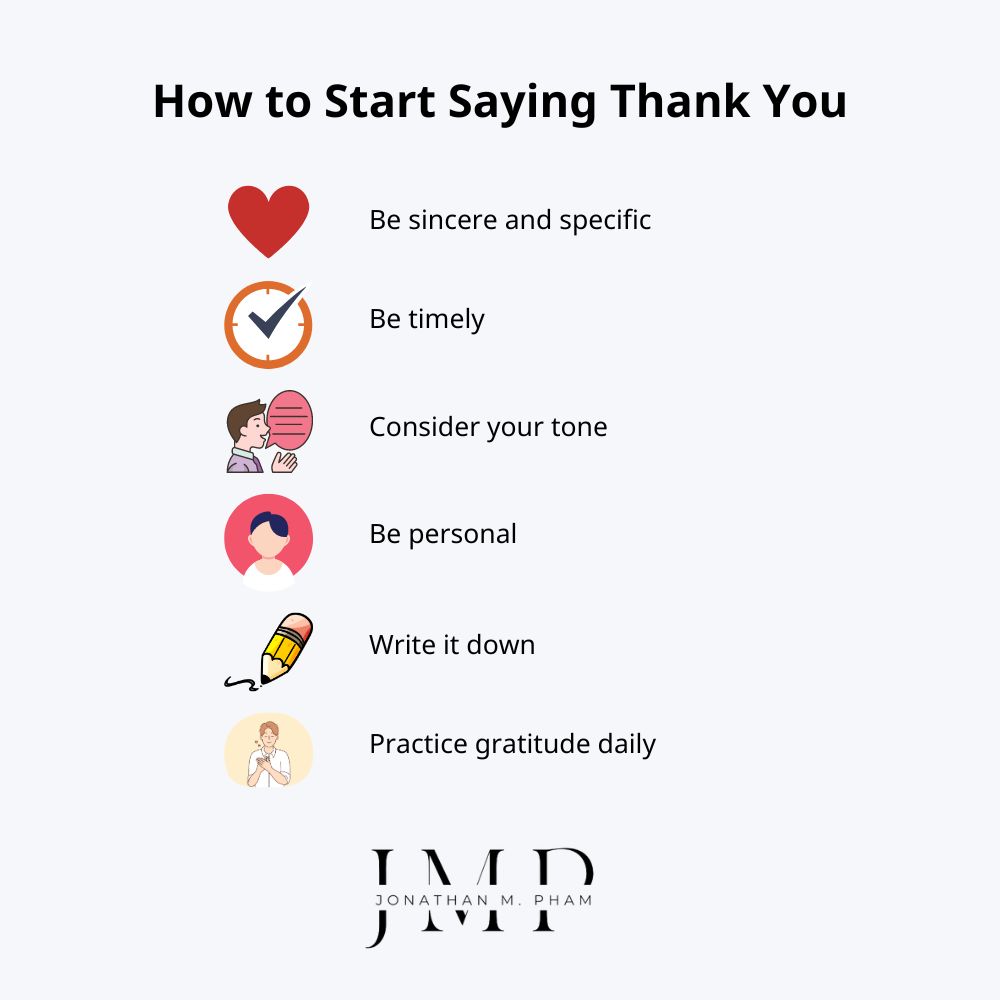Not saying thank you is the most basic form of bad manners, one among the bad habits we must overcome in order to reach greater heights.
In the current fast-paced world – filled with constant distractions and demands, most of us often fail to appreciate the art of expressing gratitude. Far too frequently, we fall prey to the bad habit of not saying thank you – even in the most obvious situations. For those aspiring to reach greater heights in life, learning to abandon this annoying behavior is a crucial requirement.
Highlights
- Not saying “thank you” is a sign of ingratitude that can seriously hurt others, even for seemingly minor things. This bad habit is more common than we realize; in fact, it manifests in various ways – from forgetting to thank a stranger for holding the door to dismissing others’ feedback, no matter how constructive it is.
- We often forget to express gratitude for a variety of reasons, from social awkwardness to narcissism, negativity, or simply being too busy. No matter what the cause is, the consequences are still the same – people feeling hurt, damaged reputation, strained relationships, and a deprivation of happiness.
- Despite its simplicity, saying “thank you” for compliments, advice, or feedback is a powerful way to strengthen and build better connections. In doing so, we demonstrate the willingness to be humble and let go of the need to win at all costs.
- Whether it is receiving gifts, getting help, or even facing criticism, we need to learn to say “thank you” in all of these situations. Even if someone’s suggestion isn’t useful – or you disagree with it, thanking them shows respect, encourages communication, and opens up windows for learning.
- In spite of how easy it is to say “thank you,” we often delay expressing gratitude and prefer waiting for a grand moment that never comes.
- Learning to express gratitude requires us to be sincere, specific, and timely, adjust our tone, personalize our messages, write them down, and make giving thanks a daily habit.
- Even if someone forgets to say thank you, try to understand, speak up respectfully if needed, or let it go and focus on the positive.
What is Not Saying Thank You?
At its core, saying “thank you” is a fundamental act of expressing gratitude, appreciation, and recognition for the kindness and support we receive from others. It is a simple – yet powerful gesture that conveys acknowledgment of someone’s effort, generosity, or thoughtful actions.
Conversely, the inability to say thank you reflects a form of ingratitude, where we fail to demonstrate appreciation for the considerate deeds bestowed upon us. It is an act of utmost rudeness and disrespect – one that can cause extreme emotional distress for those on the receiving end of our ungratefulness.
This bad habit is far more prevalent than you may realize – it permeates various facets of our lives, including both personal and professional spheres. Not only those with narcissistic personalities – in fact, we all commit the sin of failing to express gratitude whenever we:
- Neglect to acknowledge someone who holds the door for us;
- Respond to a compliment with self-criticism;
- Are oblivious/ ungracious for a thoughtful gift;
- Overlook someone’s contribution when they go out of their way to help us with a difficult task/ project;
- Are so self-centered that we take other’s help for granted;
- Do not answer someone’s invitations;
- Dismiss or frown upon well-intentioned feedback.
- etc.

When someone doesn’t say thank you
Reasons for People Not Saying Thank You
The act of not saying thank you can stem from a variety of underlying reasons, often rooted in individual behaviors, attitudes, and emotional states:
- Lack of skills
One possible cause may be related to poor interactional skills or a lack of knowledge on how to effectively express gratitude. Some of us might feel uncertain about the appropriate words or gestures to convey our appreciation, leading to hesitation in expressing thanks properly.
- Personal bias
For a few people, they may not feel entirely comfortable demonstrating gratitude – either because they perceive it as a vulnerable emotion, or believe that expressing appreciation could make them appear weak or indebted to others.
- Too busy
In our fast-paced and distracted world, it is no wonder why we often forget to say thank you. Far too often, we are preoccupied with various aspects of life – including work, family, and personal concerns, all of which play a role in diverting our attention and causing us to overlook the need to acknowledge acts of kindness/ favors we receive from others.
- Taking things for granted
Additionally, failing to recognize the effort or value of what is given to us may prompt us to take things for granted. This is an especially popular behavior among old-fashioned leaders and managers, who often expect others to put in a lot of effort without any appreciation.
- Narcissism
For some, a sense of entitlement or narcissism is an underlying reason behind their failure to demonstrate gratitude. They may believe they deserve help or kindness without the need to reciprocate, assuming that others should feel privileged to assist them.
- Negativity
Negative emotions, such as conflict or hostility towards the person who helped us, may also have an influence. In such cases, expressing gratitude might be perceived as insincere or contradictory to the underlying animosity.
Furthermore, feeling insecure also inhibits people from saying thank you. They might assume that the person already knows they are grateful – or worry that their words may not adequately convey their true feelings of appreciation.

When someone forgets to say thank you
Consequences of Not Saying Thank You
Not saying thank you carries with it a range of potential consequences, each of which can significantly impact our relationships, emotional well-being, and social dynamics. By neglecting to express appreciation, we risk creating a void of unappreciated gestures and missed opportunities for positive growth.
- Insulting others
First and foremost, failing to acknowledge one’s kindness or assistance will leave them feeling unappreciated, disrespected, and even hurt. They may believe that their efforts were in vain – or that they are taken for granted, potentially eroding the sense of importance they feel in the relationship.
- Damaging self-reputation
Moreover, such annoying behavior often tarnishes our image in the eyes of others. When we consistently refrain from expressing gratitude, we risk being perceived as rude, ungrateful, or self-centered. Such negative impressions will result in discomfort, unhappiness, or even resentment in those around us.
- Impacting relationships
Another disastrous effect of not saying thank you is its potential to damage relationships and hinder future cooperation. When others perceive us as unappreciative, they may be less inclined to help us or extend kindness in the future. This limits opportunities for growth and success, as our support network may become hesitant to lend a hand.
- Depriving us of emotional rewards
Beyond its impact on others, not expressing gratitude also robs us of the personal benefits associated with being thankful. Various research has proven that embracing gratitude is strongly correlated to improved well-being, positive emotions, and increased prosocial behavior. By neglecting to say thank you, we miss out on these valuable rewards, leaving us potentially feeling disconnected and emotionally depleted.
- Diminishing trust and connection
Furthermore, the ripple effects of gratitude extend beyond the immediate moment of acknowledgment. When we show genuine appreciation, it strengthens our social bonds, fosters trust, and inspires kindness in others. Failure to express gratitude means that we miss the opportunity to contribute positively to the social fabric, potentially hindering the growth of a more compassionate and empathetic community.
- Toxic culture
The consequences of not saying thank you also reach beyond individual interactions. When those in power such as leaders/ managers neglect to express appreciation, they set a precedent for others to follow suit, leading to a culture marked by disrespect and entitlement.

Not saying thank you is rude
We Do Not Say Thank You Enough
(This section – along with the two following ones – is compiled with inspiration from the bestseller ‘What got you here won’t get you there‘ by world #1 executive coach, Dr. Marshall Goldsmith)
Expressing gratitude through the simple words “Thank you” is a universally appreciated gesture that holds immense power in interpersonal relations. These two sweet words, disarming and pleasant to the ear, serve as a magical super gesture, capable of smoothing interactions and preventing needless conflicts.
However, despite its simplicity, many of us struggle to execute this fundamental maneuver effectively. When presented with compliments, advice, or feedback, we become unsure of how to respond. We decide to do a lot of things – from disputing to criticizing – while overlooking the most appropriate and polite course of action: saying “Thank you.”
Have you ever observed a situation like this? At a party, one person pays a compliment to a woman’s stunning dress. Instead of accepting the praise with grace, the woman just dismisses the compliment and downplays the significance of the dress.
“Oh, this old thing?” she says. “It’s just some rag I found in the closet.”
This kind of reaction unintentionally undermines the initial gesture, leaving the praise giver puzzled and potentially uncomfortable. The absence of a simple “Thank you” can create unnecessary tension and complexity where none should exist.

When you compliment someone and they don’t say thank you
To foster better communication, we must learn to embrace the default response of gratitude whenever faced with any suggestion or input from others.
If someone offers positive feedback, reply with something like “Thank you. I appreciate that”.
Similarly, when confronted with constructive criticism, responding with “Thank you. I’ll try to do better next time” demonstrates our openness to growth and a willingness to learn.
Saying “Thank you” means letting go of our overwhelming need to win, to be right, to add value, to come out on top.
Marshall Goldsmith
Saying Thank You Starts With a Shifting to a Learning Mindset
From early childhood, we were all taught the significance of basic etiquette, including the power of using “please” and “thank you.” Despite this foundational understanding, it is puzzling that a lot of us still fail to fully appreciate the impact of expressing gratitude.
Embracing a slight shift in our mindset when receiving other people’s comments can profoundly impact our interactions – as well as foster a more positive and open exchange of ideas. When someone offers a suggestion or shares their thoughts, we have the opportunity to approach the situation with a learning mindset – recognizing that their input can either enrich our knowledge or leave us with the same understanding as before.
Graciously thanking them for their contribution acknowledges their effort and goodwill, fostering an atmosphere of respect and encouragement for future dialogue.
Conversely, when we respond to suggestions without a simple “thank you,” the potential for misunderstandings and conflicts escalates. Any response other than gratitude may inadvertently come across as dismissive or confrontational, leading to unnecessary tension in the conversation.
A phrase that warrants particular attention is “I’m confused,” – as it carries subtle and potentially dishonest implications. Saying such a thing in response to someone’s suggestion is often perceived as an indirect way of rejecting or discrediting their idea.
A more constructive approach is to acknowledge their input with a sincere “thank you” – and perhaps add that the idea is something you hadn’t considered before. By doing so, we create a welcoming environment that encourages continued dialogue and fosters an atmosphere of open communication.
When somebody makes a suggestion or gives you ideas, you’re either going to LEARN MORE or LEARN NOTHING. But you’re NOT going to LEARN LESS.
Marshall Goldsmith

The Problem of Delaying to Say Thank You
It is a surprising fact that we frequently tend to delay the expression of gratitude – despite how simple such an act is. We often fall prey to the belief that we must await the perfect moment to deliver a grand and theatrical thank you – as if such a display is the only proper way to convey our appreciation.
However, in reality, we rarely know when this ideal moment will arrive – which renders this belief virtually baseless.
Dr. Marshall Goldsmith once had a talk with a client who boasted about his strong ability to express appreciation – he shared a story about his wife’s remarkable efforts in creating a private-office-cum-library at home.
While he had always desired such a space, he never found the time or energy for the significant home renovation it required. His wife took charge, managing everything from finding an architect to overseeing the entire project’s execution.
Here is how the conversation went:
“Why are you telling me this?”
“Because the room is almost done – and I haven’t thanked her yet. I’m planning to do so with a big gift for her when it’s finished.”
“Why don’t you thank her now?”
“Because I want to wait. It’ll be more impressive when the job is done.”
“That may be true. But do you think she’ll resent it if you thank her now and thank her again with a bigger gesture when the job is completed? Do you think she’ll resent you for thanking her twice?”
Gratitude is not a finite resource, but rather an abundant and inexhaustible virtue. Despite its ease of expression, we often treat it as a precious “commodity” – something which we should only give away on special occasions.
In reality, gratitude is as abundant as the air we breathe, and we have an endless capacity to share it with others.
Among the behavioral challenges we encounter, failing to express gratitude should be the most straightforward to conquer. All we need to do is to select something or someone to be grateful for, identify the person deserving of thanks, and simply say, “Thank you.”
There is no need to delay this act of appreciation, as each expression of gratitude holds immense value and can positively impact both the giver and the recipient.
Marshall Goldsmith discusses the bad habit of not saying thank you – plus the importance of gratitude in leadership
When to Say Thank You
Saying thank you is a powerful and essential way of demonstrating appreciation, respect, and gratitude towards others. It serves as a heartfelt acknowledgment of the kindness, support, or positive actions directed our way. Below are some popular situations when we must always remind ourselves to express gratitude to others:
- When someone presents us with a gift, whether big or small.
- When someone goes out of their way to do us a favor – whether it’s helping with a task, running an errand, or offering guidance. Acknowledging their efforts fosters a sense of mutual respect and strengthens interpersonal bonds.
- When we receive compliments, whether regarding our appearance, work, or personality.
- When someone lends a helping hand to help us navigate through a difficult situation/ challenging time. Whether it’s providing support in a project, resolving a problem, or offering valuable advice, saying thank you is crucial to acknowledge their invaluable contribution to our well-being.
- When someone takes the time to offer advice or constructive criticism – whether solicited or not.
- When someone’s actions bring happiness into our lives.
- When receiving unfair criticism. As surprising as it seems, responding with a gracious “Thank you” will help defuse tension and indicate a willingness to consider the feedback, even if it may be difficult to hear.
- When we find ourselves uncertain about whether to say thanks or not. In such cases, erring on the side of gratitude is always beneficial – as it demonstrates our humility and respect, creating a positive impression on others.
Read more: Asking for Help – The Power That Comes From Vulnerability
How to Start Saying Thank You & Expressing Gratitude
For those who would like to overcome the bad habit of not saying thank you, I recommend that you consider the following tips and ideas to help infuse your daily interactions with genuine appreciation and warmth:
Be sincere and specific
Whenever you would like to demonstrate gratitude, ensure that your expression is heartfelt and specific. Rather than a generic “Thank you for your help,” aim to be more explicit – by stating the reasons why you are grateful. Providing details about the other person’s contribution demonstrates your sincerity and shows that you genuinely value their efforts.
For instance, you could say, “Thank you for taking the time to help me with this project. I truly appreciate your expertise and guidance.”
Be timely
Don’t wait too long to express your thanks. Timeliness adds significance to your words, making the gesture more meaningful. The sooner you convey your appreciation, the stronger the positive impact it poses on the recipient.
Consider your tone
Sometimes a simple “Thank you” may suffice – however, depending on the situation, you might want to add more enthusiasm or emotion to your expression of gratitude. Utilize words like “very much” or other adjectives to emphasize the depth of your appreciation. For example:
“Thank you very much for your generous help” or
“I really appreciate your thoughtful recommendation.”
Be personal
Take the opportunity to personalize your expressions of gratitude whenever possible. Phrases such as “I really appreciate what you did”, “I am grateful to you for…”, “You’re the best”, “I owe you one”, or “You made my day” add variety and personality to your words, making them more memorable.
Write it down
For a more personal and lasting impact, consider writing a thank you note or letter to the person who helped you or provided something meaningful. Use a card, postcard, or piece of paper, and either handwrite or type your message. Alternatively, you can send an email if it’s more convenient.
The key here is to make your message heartfelt, sincere, and detailed, outlining what you are thankful for – and how it positively affected your life.
Practice gratitude daily
Last but not least, it is strongly suggested that you incorporate daily gratitude practices into your routine, such as:
- Keep a gratitude journal and write down three things you are thankful for each day.
- Take the time to say thanks to someone who has helped you or brightened your day.
- Send thank you messages or emails to deserving individuals.
- Engage in gratitude meditations or prayers.
- etc.
These daily gratitude exercises all help raise awareness of the positive aspects of your life and the people who play a role in it.
Additionally, on occasions when you inadvertently forget to say thank you, you may consider following these steps to address the issue:
- Acknowledge your mistake: Begin by admitting your oversight – and admit that you failed to express gratitude appropriately.
- Offer an explanation (if appropriate): If you have a valid reason, share it with the person. Otherwise, simply apologize and be honest about not knowing why you made such a mistake.
- Express genuine gratefulness: Convey your heartfelt appreciation to the person for their help or kindness. Let them know how much their actions meant to you.
- Learn and improve: After apologizing, strive to avoid repeating the same problem. Make a conscious effort to say thanks more often and show your appreciation to those who extend their help or generosity.
By embracing the practices outlined above, you should be much better equipped to nurture a culture of gratitude in your life, strengthening connections with others and fostering a more empathetic and appreciative outlook.

Read more: Self-questioning – Why Should We Practice It on a Daily Basis?
How to Respond When Not Being Thanked
While there is nothing wrong with expecting expressions of gratitude when we offer help or give something to others, people may not always act as expected. In such situations, learning to respond gracefully may help foster understanding and preserve the harmony of our interactions:
- Be understanding
If the other person is someone you know well, approach the situation with empathy and seek to understand their perspectives. Perhaps they were preoccupied or simply unaware of the significance of their own actions/ your gesture. In some cases, they may have unintentionally forgotten to say thank you – or not even noticed your act of kindness. By refraining from taking it personally, you can avoid unnecessary strain on the relationship – as well as create space for open communication.
- Speak up
In certain instances, the absence of a thank you might leave you feeling hurt, unappreciated, or undervalued. If this situation arises repeatedly – or involves someone close to you, consider voicing your feelings in a calm and respectful manner.
Instead of blaming the other person, focus on expressing your emotions directly. You can say something like, “I feel hurt when I don’t hear a thank you from you after I do something nice for you. I would appreciate it if you could acknowledge my gesture and show some gratitude.”
- Let it go
Sometimes, the reason may stem from cultural differences, varying backgrounds, or personal issues that hinder the expression of gratitude. If that’s the case, it may be best to let it go and not internalize the absence of appreciation. Instead of passing judgment, focus on the positive aspects of your relationship – and the genuine reasons that prompted you to help or give to them in the first place.
Read more: Emotional Intelligence (EQ) – Key to a More Abundant Life

Not Saying Thank You Quotes
Check out more quotes about gratitude here!
The truth is, not saying ‘thank you’ does more damage than actually saying ‘thank you’ does good.
Tommy Wyatt
Feeling gratitude and not expressing it is like wrapping a present and not giving it.
William Arthur Ward
Silent gratitude isn’t very much to anyone.
Gertrude Stein
The smallest act of kindness is worth more than the grandest intention. Thanks for helping me always.
Oscar Wilde
Gratitude is not only the greatest of virtues, but the parent of all others.
Cicero
Final Thoughts
In a world where gratitude is the simplest – yet most transformative gesture, we often find ourselves grappling with the challenge of not saying thank you enough. This detrimental habit – if left unchecked – will hinder our interpersonal relationships, breed misunderstandings, and create unnecessary tension. By understanding the reasons behind such behavior – and embracing a genuine shift in mindset, we can transform our interactions, strengthen our connections, and create a ripple effect of kindness and positivity that resonates far beyond ourselves.
Other resources you might be interested in:
- Taking Credit for Others’ Work: A Detrimental Habit
- Refusing to Apologize: How to Abandon This Insidious Habit
- Making Excuses: How to Break Free from this Cycle
- Habits in Personality Development: Guide to Mastering Your Destiny
- 200 Self-reflection Questions: Toolkit for Life Pilgrims
Let’s Tread the Path Together, Shall We?


